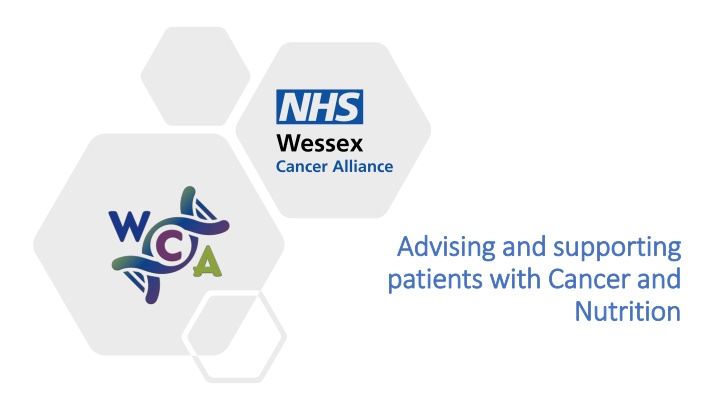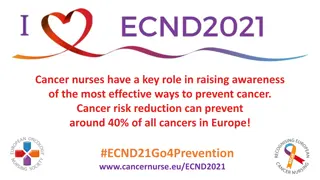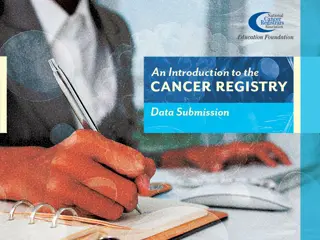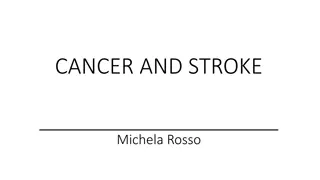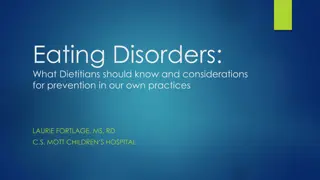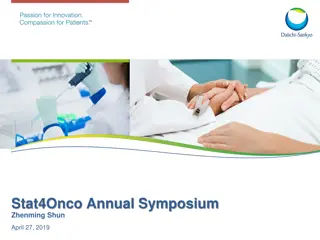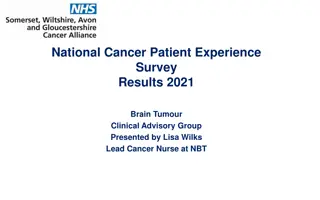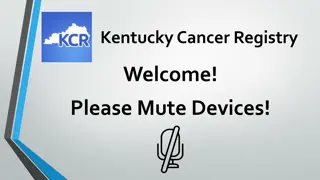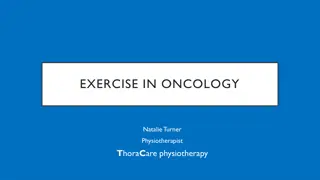Supporting Patients with Cancer: The Role of Dietitians in Oncology
Dietitians play a crucial role in helping cancer patients manage nutrition and combat malnutrition during treatment. They provide dietary advice, support patients undergoing chemotherapy, radiotherapy, and surgical treatment, and help address side effects. By recognizing and treating malnutrition, dietitians play a vital role in cancer care and survivorship. Learn more about the impact of nutrition in oncology and how dietitians can make a difference.
Download Presentation

Please find below an Image/Link to download the presentation.
The content on the website is provided AS IS for your information and personal use only. It may not be sold, licensed, or shared on other websites without obtaining consent from the author.If you encounter any issues during the download, it is possible that the publisher has removed the file from their server.
You are allowed to download the files provided on this website for personal or commercial use, subject to the condition that they are used lawfully. All files are the property of their respective owners.
The content on the website is provided AS IS for your information and personal use only. It may not be sold, licensed, or shared on other websites without obtaining consent from the author.
E N D
Presentation Transcript
Advising and supporting Advising and supporting patients with Cancer and patients with Cancer and Nutrition Nutrition
Dietitians work across cancer sites and across treatment types. Work with patients undergoing chemotherapy, radiotherapy and surgical treatment. Work to combat side effects of cancer and side effects of treatment. The Role of a The Role of a Dietitian in Dietitian in Oncology Oncology services services Recognise, diagnose and treat malnutrition. Provide dietary advice through treatment and beyond. Work with after effects of cancer treatment and help with cancer survivorship. Dietitians also have a role in cancer prevention!
Malnutrition in Oncology Patients Malnutrition in Oncology Patients High risk of malnutrition both due to their illness and as a result of treatment. Up to 50% of patients present with weight loss at diagnosis, this can continue throughout treatment. Malnutrition is caused by a imbalance of protein and energy (calories) intake. Protein requirements for cancer patients can be up to double the recommended level for the general population. The reasons for poor oral intake can be complex and multifactorial. At any one time, it is thought that up to 80% of cancer patients are malnourished at any one time.
Dietitians can have a direct impact on these side effects! * * * * * Cancer and Cancer and Treatment Treatment Side Effects Side Effects * *
Helping patients to achieve a higher energy and protein intake through: Food fortification Oral nutritional supplements Enteral / artificial feeding (if appropriate) Limiting fad and potentially dangerous diets How do we How do we combat these? combat these? Combating nutritional issues before they happen E.g. placing feeding tubes before treatment Preventing inpatient stays if possible, but also promoting inpatient admission as needed The role outside of the dietitian being an extra person to support!
Where to find us? Where to find us? Referral through the patients Oncology or Haematology consultant. Referral through a Clinical Nurse Specialist. Contacting the patient s GP regarding the patient and asking for a referral to an Oncology Dietitian.
Further information and resources Further information and resources Cancer Research UK Macmillan World Cancer Research Fund British Dietetic Association (BDA) Oncology Specialist Group Bloodwise (for haematological cancers) Trekstok (for teenagers and young adults)
